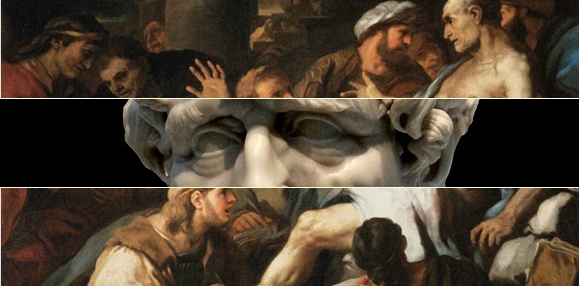James Romm on the Cunning Role of Seneca in Nero’s Court
By Jennie Yabroff

La mort de Sénèque © Luca Giordano (1632–1705) | Bust of Seneca © Jean-Pol GRANDMONT
Of all the thankless jobs, advisor to a mercurial, unbalanced, paranoid boss has got to be one of the worst. Yet for a while, Seneca, ancient philosopher and writer, used his position as tutor to the boy emperor Nero to co-rule the Roman empire. Seneca was a cunning, persuasive politician, adept at navigating the treacherous waters of the Roman government. His public exhortations of a life of virtue and ethical correctness contrasted with his own instinct for self-preservation at any cost.
But even he could not escape the fate that befell so many public figures of the day -- suicide, at the behest of his former boss. In his biography Dying Every Day, scholar James Romm studies Seneca’s extensive writings for hints at the man behind the contradictions, and gives us a compelling, and terrifying, vision of a bloodthirsty, ruthlessly ambitious emperor and his court. He spoke to us about his research, and how Seneca might fare today.
Biographile: In Dying Every Day, you present two versions of Seneca: one, a virtuous philosopher, and the other, a duplicitous politician. Which version did you think was accurate before you began researching the book? How did that opinion change?
James Romm: My perplexity that I started with only got deeper as I got more into it. I had always known he was paradoxical and wrote a huge body of different kinds of literature that were hard to put together into one body. I thought perhaps I would solve the mystery but the mystery only deepened. I came away astounded that one man could live such separate existences.
BIOG: You've written several books on the ancient world. What’s the greatest challenge of writing about that time period?
JR: It’s very rare that you get access to a person’s interior life, since there are very few letters in antiquity. You have these rhetorical public presentations that are carefully edited and not always indicative of a person’s inner life. With Seneca I felt there were at least some writings that give you a sense of his thoughts and countenances. But it’s very hard to find access to the behind-the-scenes man. You have to do a lot of guesswork.
BIOG: Because Seneca wrote so much, he must have been aware of crafting his self-image for posterity. Did this make it easier or harder to get a sense of the true man?
JR: It makes it very tricky to know where he’s being genuine and where he’s playing a political game. He was very good at concealing his strategies behind philosophical meditations. He might not have known himself where the border lay between those two things. In some places I had to leave it an open question how much he’s speaking to Nero or his contemporaries, and how much to us in posterity.
BIOG: What was the most surprising thing you learned?
JR: My most surprising insights were into Nero. Before writing the book I didn’t fathom how messed up he really was, how psychologically tormented he was by his mother and his delusional singing career which eventually brought his downfall, along with his total lack of aptness for governance. I knew he was bad but I never really glimpsed how bad.
BIOG: What was the hardest aspect to research and write?
The biggest difficulties were the unanswerable questions about key events. For example, the fire of Rome, which is the biggest single event in the period my book covers. It’s simply not knowable whether Nero set the fire or not. To have to shrug one’s shoulders there is a very frustrating thing. I had to do several of those shrugs of the shoulders.
BIOG: What does your gut tell you about the fire?
JR: I really don’t know if Nero did it. It’s certainly not beyond the realm of possibility but in my heart of hearts I don’t think so. I don’t think he was that depraved.
BIOG: Reading this book, I was reminded of the series House of Cards, with all the political intrigue and, in the case of ancient Rome, literal backstabbing. Why do you think we have such an appetite for these stories of political treachery?
JR: I think our age is very cynical about politics. We've seen a lot of the politicians we once admired turn out to be bums, and we know the tools it requires to get ahead in politics -- you need weapons more than you need strategy. It’s become much more cut and thrust. I think it’s a healthy cynicism that we understand the people who got to the top did dirty deeds along the way.
BIOG: Is there a modern figure, political or otherwise, who is comparable to Seneca?
JR: Henry Kissinger comes to mind. Kissinger was a very smart man and an ethical man but he was thrust into a political position where he had to collude with the Nixon administration and had to prop up Nixon when it was obvious he had committed crimes in Watergate. Of course what Kissinger lacks is the literary dimension. He was exclusively a politician -- there is not anyone today who has combined the literary ambitions with the political career in the way Seneca did.
BIOG: You quote Lord Macaulay, who said of Seneca’s writing, “there is hardly a sentence which might not be quoted, but to read him straightforward is like dining on nothing but anchovy sauce.” Do you have a favorite Seneca quote?
JR: I guess the one that comes to mind because of the irony is the line from his play Agamemnon where he says that to not stop a wrong is the same as encouraging it. You’re as guilty if you don’t stop someone from doing a crime if you had done it yourself, which is ironic considering how he lived his life.
